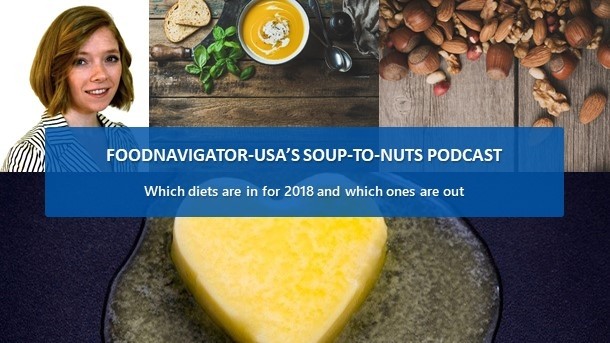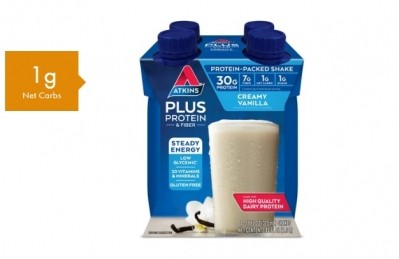Soup-To-Nuts Podcast: When and where to place marketing bets on fast-moving diet trends in 2018

Despite iffy scientific support and a plethora of nutritional red flags, the high-fat, protein-dense and extremely low-carb ketogenic diet is predicted to be one of the top three “it” diets in 2018, according to Pollock Communications and Today’s Dietitian’s “What’s Trending in Nutrition” national survey of more than 2,000 registered dietitian nutritionists.
The survey of more than 2,000 registered dietitian nutritionists also calls out clean-eating and plant-based diets as “in” for 2018 and low-fat, DASH and Wheat Belly diets as “out” for 2018.
Predictions that clean-eating and plant-based diets will emerge as the top one and two diets in 2018 should come as no surprise, but this is the first time that the ketogenic diet has appeared on the list and for it to debut in the top three and overtake the popular paleo diet is notable, according to Jenna Bell, who is a registered dietitian and the senior vice president of Pollock Communications.
She explains why consumers are drawn to the diet, as well as its nutritional downsides and how these two factors will shape the short- and long-term marketing potential for ketogenic products. She also talks about the marketing potential of the other diets that are “in” and “out” for 2018.
The sudden rise and risks of the ketogenic diet
The sudden popularity of the ketogenic diet likely is based in part on consumers' desire to eat previously forbidden high-fat foods with abandon and the success so many people experienced on the Atkins diet, which also restricts carb consumption, albeit to a less extreme degree, Bell explains.
“Ketogenics has become so popular because … on paper it does look appealing. Starting the day with eggs and bacon sounds like a great idea. And then following it up having a fat-based snack, so looking at peanut butter, and lunch being predominately lunch meat and mayo. … These are things that look appealing to people,” Bell said.
She also notes that many people come to a diet out of desperation and hope based on the evolving scientific understanding of fat in the diet, or on results that they saw in others who followed the Atkins diet, which also restricts carbs – albeit at a much lower rate.
However, consumer fascination with the ketogenic diet, as with many fad diets, could be short term given how difficult it is to follow and the potential serious health consequences. This in turn could limit the marketing potential around the diet.
“There are downsides, obviously, from a nutritional standpoint. You know, people report being constipated, having … a high level of acidity or low glucose level, which can really make people feel bad. And it also can cause people to feel emotionally challenged,” so it is hard to know if people could maintain the diet for very long, Bell said.
If they do, they will need to closely monitor their blood lipid levels, which might be a step too far that discourages participation in the diet, she added. Also, she says, there could be issues with vitamin and mineral deficiencies that could hinder long-term compliance.
Despite these concerns, Bell stops short of fully condemning the diet. Instead she says even though it is a “nutritional nightmare,” it could help people lose weight as a pattern that helps them learn to restrict their calories.
Is ketogenics a strong business bet?
Given the health risks and difficulty sticking to the diet, Bell doesn’t see ketogenics as a strong financial bet for manufacturers in the long-term, but she says there is room for fast-moving companies that are comfortable serving niche markets. There also is potential for companies that already target consumers who have adopted low-carb lifestyles.
“There is room for innovation because I think, at this point, it seems to be very much focused on more of the fringe … natural food market. It seems to be found a lot in foods that are directed towards someone who has a performance [goal] or something in physical fitness,” she said.
There also is room for innovation in the cereal, snacks and dessert segment for the broader group of consumers who are restricting carbs, she added.
The rise of ketogenics powers the fall of low-fat
As consumer fascination with high-fat diets rises, it is only natural that their interest in low-fat diets and products would wane. But Bell says there is more to why so many RDs think low-fat diets will be out in 2018.
“A low-fat diet wasn’t necessarily that winning lottery ticket that everyone thought it would be, and so then when the science started looking at the guidelines and the benefits of poly- and mono-unsaturated fat … then we realized there were health foods that have fat in them. So, it has just gone out of business in consumer minds, but also in healthcare professional minds,” she said.
As such, she hypothesizes that many consumers think if a low-fat diet didn’t work and if some fat is healthy, then maybe a high fat diet will work for weight management.
“There is a link” between the rise of ketogenics and the fall of low-fat and it is a pendulum that has swung from one extreme to the other, Bell said. But to see the most results, that pendulum really needs to stop in middle, which is not what consumers want to hear, she added.
“You know what is really not sexy and exciting? It is the middle. Moderation. Moderation is the most boring word anyone ever said,” Bell said.
The lingering market for low-fat
Even though low-fat might be out for 2018, Bell says there are plenty of people who still are looking for low-fat products.
She explains that many Gen Xers and Baby Boomers had the low- and no-fat mantra drilled into them that many will not let go, no matter what the science shows. As such, they will continue to look for low-fat claims, even though they might not place on them the same level of credence they once did.
Similarly, consumers don’t view low-fat as a negative and for those who are calorie counting, lower fat foods afford them a way to eat more without going over their calorie budgets, Bell said.
With so many contradictions in diet trends, it can be hard for manufacturers and dieters to know what to do – especially if they are planning for long term investments or change. To avoid the whiplash that can come from following fad diets, Bell recommends both groups follow the same advice.
“For food manufacturers or dieters, diversity and variety” are the best bet, Bell said. “You are just never going to go wrong if you have a diverse” diet or product portfolio.


















